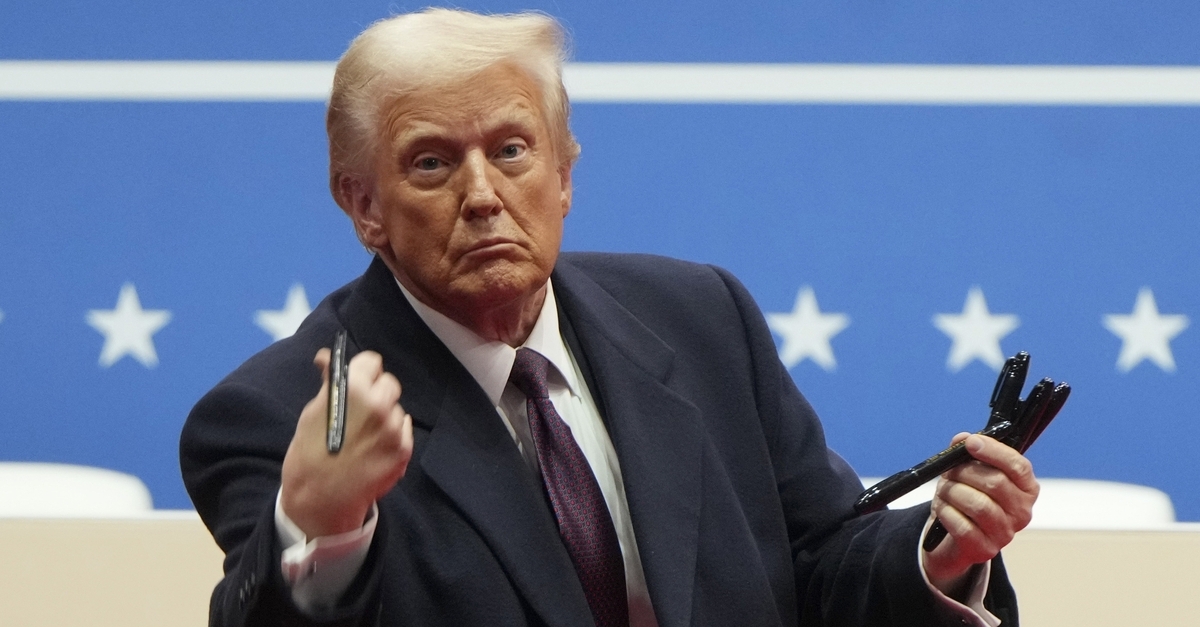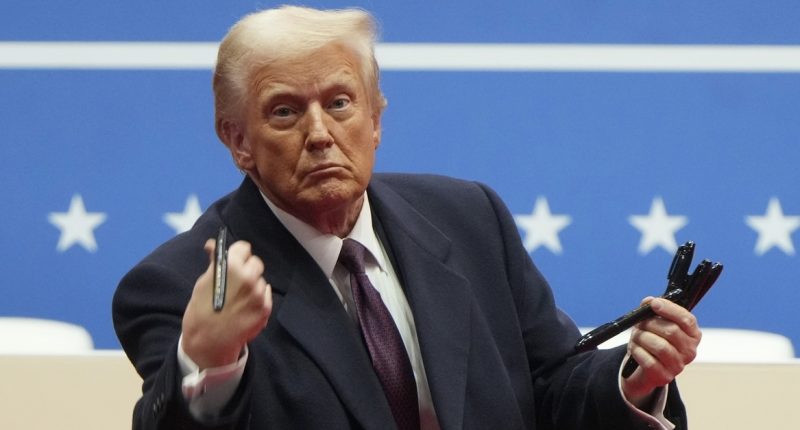
FILE — President Donald Trump throws pens used to sign executive orders to the crowd during an indoor Presidential Inauguration parade event in Washington, Monday, Jan. 20, 2025 (AP Photo/Matt Rourke, File).
The Trump administration on Tuesday told a federal judge that an administrative agency head intends to defy a court order in an ongoing lawsuit over the mass-firing of thousands of government workers.
In the underlying litigation, the American Federation of Government Employees (AFGE) and other labor unions accuse the Office of Personnel Management (OPM) of embarking upon an “illegal program” that ordered several federal agencies to fire employees via “standardized notices of termination, drafted by OPM, that falsely state that the terminations are for performance reasons.”
To date, U.S. District Judge William Alsup, a Bill Clinton appointee, has echoed the plaintiffs by calling the firings “illegal.” In a February order, the court said OPM has no authority over other agencies’ staffing. And, in a series of later rulings, the court ordered OPM acting Director Charles Ezell to testify under oath over his attested-to claims about the layoff directive — threatening sanctions for noncompliance.
Now, the government says there is no way Ezell will be testifying. Simultaneously, the U.S. Department of Justice moved to rescind Ezell’s declaration on which the order to testify was based.
“Defendants inform the Court that they do not intend to produce any live witnesses as part of their hearing presentation and intend to rest on their legal arguments for why a preliminary injunction should not issue,” the government’s motion reads. “As part of this presentation, Defendants are withdrawing the declaration of Acting Office of Personnel Management and will not be presenting Mr. Ezell at the hearing.”
The hearing in question is slated for Thursday afternoon.
In an order issued on March 10, Alsup rejected the government’s request to cancel the evidentiary hearing. The judge also rejected a request to keep Ezell from testifying and previewed a road map for sanction should Ezell decline to testify.
“The Court’s order that he appear or be deposed will not be vacated, nor will the hearing on March 13,” the judge wrote. “If Ezell does not appear in violation of that order, then the Court will have to decide the sanction, including whether or not to strike or limit his sworn declaration.”
Now that the Ezell declaration has been withdrawn, the upshot of the government’s forthcoming defiance of the court order is unclear. If, for example, the sanction foreseen by the court is limited to the declaration, the impact could be minimal to nil.
The court’s previous order threatening sanctions notes that the government’s position has little daylight between Ezell’s declaration.
“The problem here is that Acting Director Ezell submitted a sworn declaration in support of defendants’ position, but now refuses to appear to be cross examined, or to be deposed (despite, it should be added, government counsel’s embrace of that very idea during the TRO hearing),” Alsup mused.
Ezell and OPM, for their part, maintain that they did not actually direct any agencies to fire anyone — but merely told agencies to review their probationary workers and make determinations about whether to continue their employment based on need.
And, to hear the government tell it, the rescission of the declaration more or less makes the prospect of Ezell testifying a moot point.
“Because the Court’s stated purpose of bringing Mr. Ezell to the hearing was to obtain testimony from him regarding the contentions made in his declaration, Defendants therefore submit that his presence is no longer necessary at any hearing given that this declaration is now withdrawn,” the DOJ filing reads.
Love true crime? Sign up for our newsletter, The Law&Crime Docket, to get the latest real-life crime stories delivered right to your inbox.
The government insists procedure in the case so far has taken a wrong turn.
The plaintiffs, in their original lawsuit, filed some of their claims under the Administrative Procedure Act (APA), which is the statute governing most litigation against administrative agencies.
In APA cases, the government says, expedited discovery is disfavored unless there is a clear need “to plug holes in the administrative record.” That, the DOJ argues, is not the case here.
“Thus, until such time as Defendants have submitted an administrative record, and until such time as Plaintiffs raise any issues with that administrative record, any kind of testimony or discovery on Plaintiffs’ APA claims is inappropriate,” the government’s motion goes on. “Moreover, testimony at this preliminary stage is generally disfavored by the Ninth Circuit.”






